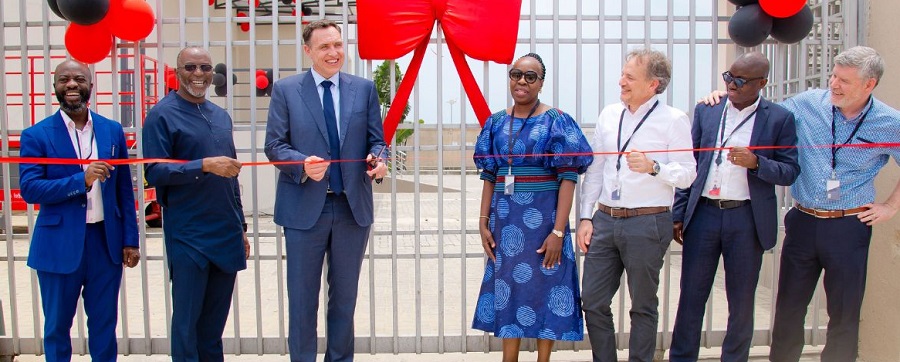E-Business
Obi, Ex-Gov Anambra State Says TD is Company to Trust

Peter Obi, business magnate and former Governor of Anambra State, has hailed Technology Distributions Ltd. (TD Africa) as an organization built on integrity and sound credentials.

Peter Obi
He stated this while speaking at Celebrating You 2019, an annual year-end dinner/awards party organized by Sub-Saharan Africa’s biggest ICT products distributors, TD.
The event, arguably the most eagerly-awaited celebratory event in the Nigerian ICT ecosystem, was held on Sunday December 8th 2019 at the prestigious Eko Hotels & Suites, Victoria Island, Lagos.
On an annual basis, Celebrating You focuses on sharing deep insights with attendees on diverse areas of the economy. The 2019 edition was not different as Obi proved a fitting resource person who drew from his personal experiences in addressing guests.
‘‘I must mention that I have a special relationship with TD which is based on performance. It is a company that you can rely on. I remember many years ago while I was still in office at exactly 1am when I called Mr. Leo Stan Ekeh to say I wanted to buy 30,000 laptops. I still recall his response till today. He told me that he does not do business with state governments and that even if he wanted to, he does not think the Anambra State Government could afford to pay for the 30,000 laptops without credit.
‘‘I assured him that the laptops would all be paid for which we did upfront without collecting a bank guarantee. And they were supplied by TD and all of them deployed to specifications down to the very last one. I must confess, the execution beat our expectations. Today, the feat achieved by the Regina Pacis school girls who shocked the world at Silicon Valley, USA in 2018 can be attributed to this effort by TD and the Zinox Chairman. Though we paid for the equipment but TD added huge value and Anambra is better for it till date. Also, Anambra State has continued to emerge tops in school knowledge tests and examinations conducted over the past couple of years. The investment in technology and TD’s contribution played a key role in making this happen,’’ he said.
Obi, who was the Special Guest of Honour and who was wearing the cap of entrepreneur at the event, further described TD’s place in the Nigerian ICT distribution landscape as very essential to the current developments and gains recorded in the sector. Further, he urged budding entrepreneurs and small business owners to borrow a leaf from TD’s remarkable consistency, track record of delivery and integrity which has seen it all the way to the top.
Also speaking at the event, Chief Executive Officer (CEO), TD Africa, Mrs. Chioma Ekeh identified tenacity as the enduring attribute that has kept the organization at the top of its game over the past 20 years.
‘‘This quality, more than anything else, sets TD apart and makes us different. We keep our promises,’’ she said.
Further, she heaped praises on the entire Management and staff of TD, whom she described as the lifeblood of the company, even as she expressed deep gratitude to the special guests and other attendees for honouring the invitation.
The Zinox Group Chairman, Ekeh who extended best wishes of the season to all, also assured younger entrepreneurs that there seems to be light at the end of tunnel with the rebranding of the Ministry of Communications to Ministry of Communications and Digital Economy by President Muhammadu Buhari and with a tested hand as the Minister.
‘‘The new addition resonates confidence and assures certified future for smart entrepreneurs,’’ he enthused.
Meanwhile, the event witnessed the presentation of awards to deserving Original Equipment Manufacturers (OEMs) and other channel partners. Top winners on the night include Dell-EMC, Huawei, Konga, Edgebase Line Ltd. Allied Computers, HPI, among others. The event also witnessed top-notch performances from A-list artistes including Kizz Daniel, Flavour, comedian SLK and Okey Bakassi who doubled as the MC/compere.
Equally important, Celebrating You remains arguably the only one which brings together the major competing local and international Original Equipment Manufacturers (OEMs) and other stakeholders in the industry under one roof, albeit in a fun and relaxing atmosphere.
In attendance was a host of knowledge-driven resource persons including former Vice Chancellor, University of Lagos, Prof. Ibidapo Obe; Chairman TDBoard of Directors, Prof Anya O. Anya; former Deputy Governor of the Central Bank of Nigeria (CBN), Ernest Ebi; Group Deputy Managing Director, Access Bank, Roosevelt Ogbonna; among many others.
E-Business
Equinix Launches LG2.3 Data Centre in Nigeria

Equinix, global digital infrastructure company, has launched a cutting-edge LG2.3 data centre in Lagos aimed at fueling Nigeria’s booming tech scene.

Equinix officials at the launch
The data centre is designed to provide businesses with secure, reliable, and high-performance colocation and interconnection services, crucial for supporting the increasing demand for digital services across the region.
Nestled in the bustling Lekki Free Zone, LG2.3 is packed with the latest tech, offering businesses the secure and lightning-fast connections they crave. Think of it as the engine room for Nigeria’s online world, designed to handle the explosive growth of digital services.
The launch featured Bruce Owen, president, Equinix’s EMEA, who cut the ribbon to open the data centre.
“Nigeria is our focus,” Owen declared, emphasizing Equinix’s dedication to powering the nation’s digital growth. “The energy here is incredible, and we’re excited to be part of it.”
On his part, Wole Abu, managing director, Equinix’s West Africa, echoed this sentiment highlighting the increasing global demand for digital infrastructure.
“Africa is on the cusp of a digital explosion, and we’re here to support that growth,” he said.
Nigeria’s digital adoption is skyrocketing, driven by a young, tech-savvy population. Businesses are racing to embrace online platforms, and LG2.3 is perfectly positioned to meet their needs.
This investment is set to create a ripple effect, boosting the economy, creating jobs, and fostering innovation.
LG2.3 is set to be a beacon for Africa’s tech potential.
Equinix’s confidence in the continent aims to attract more global players, turning Africa into a digital powerhouse.
This data centre will act as a vital connection hub, empowering businesses to connect and collaborate, bridging the digital divide.
Equinix’s vision extends beyond Nigeria, with plans to expand across Africa.
strategic move reflects their commitment to building a connected and thriving digital ecosystem.
The success of LG2.3 is a testament to the power of public-private partnerships, with the Nigerian government playing a crucial role in attracting investment.
As Nigeria marches towards a digital future, Equinix’s LG2.3 data centre will be a key driver of progress. It’s a powerful symbol of Nigeria’s digital ambition and a catalyst for Africa’s tech revolution.
E-Business
Microsoft Marks 50th Anniversary with Major Copilot AI Update

Microsoft is celebrating its 50th anniversary with a major leap forward into artificial intelligence, unveiling significant updates to its AI assistant, Copilot.

The announcement was made on April 4, 2025, at the company’s headquarters in Redmond, Washington, marking a milestone for both Microsoft and the AI industry.
As the tech giant celebrates its golden anniversary, the company is setting its sights firmly on the future, particularly with its AI-driven tools.
Microsoft’s Copilot, which has been integrated into various software tools across its ecosystem, has now received a significant upgrade.
The new features aim to make the Copilot assistant more intelligent, personalised, and proactive, which positions Microsoft as a serious competitor in the AI space against other industry leaders such as OpenAI’s ChatGPT and Anthropic’s Claude.
Mustafa Suleyman, head of Microsoft’s AI division, expressed the company’s ambition, saying, “We envision Copilot not just as an assistant, but as a long-term AI companion, one that can learn, adapt, and evolve alongside its users. This goes beyond just responding to commands; it’s about fostering relationships between users and their AI.”
The most notable update to Copilot is its new memory functionality. Now, the assistant can retain information such as preferences, previously used commands, and even personal context, making it more responsive and efficient in future interactions.
This means Copilot can, for example, anticipate a user’s needs based on past behaviours, from scheduling meetings to suggesting restaurants for a night out.
In addition to the memory features, Copilot’s new “Vision” capabilities extend the AI’s functionality across multiple platforms. Windows and mobile users will now be able to interact with Copilot using both the camera and on-screen elements.
This includes actions such as booking appointments, managing tasks, and even shopping online — all in a more interactive and seamless way.
Scott Guthrie, Microsoft’s Executive Vice President, shared his enthusiasm about the potential of these advancements, stating, “With these new capabilities, we’re not just reacting to AI’s capabilities — we’re shaping the future of how users interact with technology. AI can do so much more than just assist with tasks. It can enrich the human experience.”
The updated Copilot is designed to challenge industry competitors like ChatGPT and Claude, offering more personalised and context-aware interactions.
Microsoft has positioned its Copilot as a tool that not only assists users but builds a deeper, more intuitive relationship over time.
The company has also placed a strong emphasis on AI accessibility. With AI’s growing role in everyday tasks, Microsoft aims to make it easier for users to adopt and benefit from these technologies, regardless of their technological proficiency.
Despite past challenges, including legal disputes over privacy and AI ethics, Microsoft continues to push boundaries in the AI space. Guthrie remarked, “This is just the beginning. As we continue to innovate, we are reshaping how people work, interact, and live with technology.”
With Copilot’s advancements, the tech giant hopes to continue its legacy of innovation, making AI tools accessible and useful for people around the world.
E-Business
Report Suggests a Slash in Mobile App Usage By 2027 Due to AI Assistants

By 2027 mobile app usage will decrease by 25 per cent due to AI assistants according to Gartner, Inc. Smartphone users will turn to AI assistants, such as Apple Intelligence, ChatGPT, Google Gemini, Meta AI, and others to replace apps for many functions.

In addition to the impact of AI assistants, apps will be consolidated across separate brands and companies, creating mobile app partnerships or consortiums to reach more users per app at scale and defray the cost of creation and maintenance.
“CMOs should begin scenario planning for the impacts of decreased mobile app usage,” said Emily Weiss, Senior Principal for the Gartner Marketing Practice.
“Brands with low app engagement and retention will likely be first impacted – this will be a positive development for brands that are not overly reliant on driving revenue via apps as app development costs will decrease.
Other brands may be severely impacted by the disintermediation of users turning to AI assistants for services. The loss of app users will also result in the loss of first-party data collection and the ability to reach fewer users via mobile push notifications,” Emily added.
By 2026, Over 1/3 of Web Content will be Created for the Purposes of Gen-AI Powered Search According to Gartner’s 2024 CMO Spend Survey of 395 respondents between February and March 2024, the average CMO allocated almost a quarter of their digital marketing budget to search.
Other than end users directly visiting a website, search currently drives more traffic to the average commercial enterprise website than any other referral source.
Given this, a loss of search driven traffic due to algorithmic shifts by major search engines would result in tangible, negative commercial impact to any organisation.
“CMOs will need to direct their teams to hire talent with a strong understanding of how GenAI, and broader AI influences, impacts the performance of their content in search algorithms,” said Weiss.
“It will be important to upskill the function by investing in search and content talent with AI skillsets. These associates will need to have familiarity with creating or optimising content to train and rank within evolving search algorithms,” she said.
By 2028 digital Mlmarketers will move 30 per cent of their paid social budget to support advertising and partnerships on subscription-based channels It is becoming more challenging for CMOs to maintain, let alone grow, their reach and engagement among consumers.
This is especially true as consumers shift their tech and media behaviors away from social media, to other platforms and subscription based channels.
Gartner’s 2024 CMO Spend survey found that since 2022, paid social has maintained the highest budget allocation for all digital media spend. In 2024, B2C Marketing leaders reported allocating 14.3 per cent for their digital channel budget to social media advertising (an increase from 12.3% in 2023).
“Closed group communities and subscription channels of – fer a potential alternative for social media weary consumers and content creators who want to do more than feed the algorithm,” said Weiss.
“Brands can leverage closedgroup subscription channels – such as Substack, Patreon, and Discord – and the professional creators on them to reach relevant target audiences who are already engaging with content they self-selected into consuming,” she added.
Current AI models, such as large language models (LLMs), lack the agency to autonomously execute tasks and adapt in complex environments.
However, as new levels of intelligence are added, new AI agents are poised to quickly become more capable and reliable as brands seek to address customer facing use cases.
“There will be more AI agents than people, so while current approaches require humans in the loop, this idea will quickly become antiquated.
Marketers will need to determine when and how they can trust AI agents to act on behalf of the brand and customers across key areas,” said Weiss.

 General News2 days ago
General News2 days agoAirbnb Community Fund Donates ₦13 Billion to Nonprofits Worldwide

 General News2 days ago
General News2 days agoNigerian Military Makes History with Africa’s First Attack Drones, Bombs

 News2 days ago
News2 days agoShell, Renaissance Face Legal Action over SPDC Licence Transfer

 Telecom2 days ago
Telecom2 days agoNigeria Heads Anglophone Data Protection Committee

 E-Business2 days ago
E-Business2 days agoKike, Nigerian Tech Firm Launches ‘Kike AI’ for Kitchen Innovation

 E-Financial2 days ago
E-Financial2 days agoSterling Bank Makes Online Transfer Charges Free of Charge

 Telecom1 day ago
Telecom1 day agoMTN Denies Data Theft Allegations, Says no Financial Incentive to Do So

 News2 days ago
News2 days agoWorld Bank Approves $1.08Bn Loan for Nigeria



























